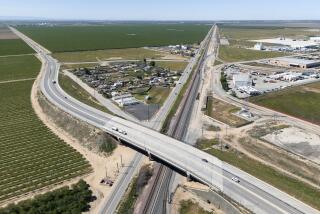A quiet town goes after jobs for its young people
- Share via
FAIRHOPE, Ala. — The notion of this town searching for economic growth seems about as unlikely as Donald Trump begging for dollars on Broadway.
Outwardly, Fairhope seems to have everything it needs. An idyllic town on the eastern shore of Mobile Bay, it is graced with flowers on its lamp poles, elegant little shops and the kind of small-town trust that allows its 9,000 residents to leave their doors unlocked.
A growing number of artists and writers have found a home here, attracted by the peace, quiet and beauty. Retirees love the place. “The real L.A.,” some call it, as in “Lower Alabama.”
To others it is the Carmel by the Sea of the South. At least, the Carmel of decades ago. As Cheryl Bell, visiting from Birmingham, Ala., put it: “It reminds me of where my grandmother lived.”
Yet, unlikely as it seems, the town is struggling with a dilemma centering on attracting industry. That struggle is becoming more pervasive nationwide, as more and more people seek ways to make a living for themselves and their children without having to live in a big city or near heavy industry. As population density rises, so does aggravation with commuting long distances from pastoral home settings to jobs in inhospitable places.
“The problem of small towns not having jobs for kids is happening to thousands of communities across the United States,” said Kolleen Crandall, executive vice president of the Eastern Shore Chamber of Commerce, which is leading an effort to attract industry here. She said there is so little opportunity that as college students graduate, parents “are saying goodby to their children, and they know they won’t be back until (the children) are ready to retire.”
Fairhope’s challenge is to solve that problem without ruining the town, without turning it into another Hilton Head, S.C.--overdeveloped, long on crowds and short on charm.
Recently, a community meeting--a combination pep rally and strategy session--was devoted to the subject, complete with speeches and a question-and-guess session. Survey forms passed out to the 150 participants solicited their comments on the prospects for economic growth.
According to Crandall, one woman expressed the concerns of many: “I saw Santa Barbara (Calif.) destroyed in five years,” she wrote. “Once it goes, you can never get it back.”
Fear and loathing of commercialization, condo-izing and cutifying are palpable here, even as the town churns toward a summer deadline on what Crandall calls a “comprehensive, strategic plan” for wooing a clean, inoffensive business, such as a corporate headquarters. Here no one would dream of bringing in a smokestack industry.
Those who resettled here from other places seem the most fearful. They have seen the other side and want to hold onto what they’ve got.
Susie Glickman, who moved from Los Angeles last June and operates a bed and breakfast inn a few blocks from the bay, said: “I want to see (Fairhope) grow, but I don’t want to see industry ruin this place.”
She added: “You’re caught between a rock and a hard place. You want to see the place stay the same, but you know it has to grow in order for people to be able to afford to stay here.”
Kitty Richmond’s three sons, ages 27, 25 and 22, work outside Fairhope, although two of them live here. Richmond, an 18-year resident, asks: “Why should they be required to go somewhere else to make a living?”
She shudders at the thought of Fairhope becoming a tourist mecca. “I don’t want my kids to be restricted to working in the service industry.”
While most seem to agree that some kind of clean, inoffensive, well-paying industry is needed here, they know that finding it won’t be easy.
Some say that the town’s tax system is part of the problem. The small group of Iowans who settled the area in 1894 put into practice the single-tax theories of Henry George, a philosopher and economist. In a single-tax colony people can buy, own, improve and sell homes and businesses, but not land. Today, the Single Tax Corp. owns 4,300 acres in Baldwin County, collects taxes on the land and issues 99-year leases on it instead of selling it. Some argue that no industry would want to invest in land it cannot own.
During the community meeting, officials also warned that competition is stiff: Each year, about 7,000 American towns try to woo an estimated 500 businesses that want to relocate.
The clash of desires--wanting both jobs and unspoiled natural beauty--surfaces often. During the community meeting, an analyst said that Fairhope’s lack of railroad service is a liability. From the back of the room came a sarcastic comment: “That’s a plus!”
More to Read
Inside the business of entertainment
The Wide Shot brings you news, analysis and insights on everything from streaming wars to production — and what it all means for the future.
You may occasionally receive promotional content from the Los Angeles Times.










